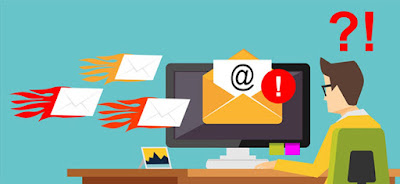WHAT IS EMAIL BOMBARDMENT?


How to combat spam and phishing email threats
Basically, spam is a form of junk mail unwanted by the recipient. Generally, this is a single message that contains advertising and is sent to different recipients who never agreed to receive it. Common methods used by spammers to build their email lists include buying address lists, tricking users into submitting their information through bogus free product offers and contests, or using collection programs of emails to extract addresses from websites.
Why is
spam email more than a nuisance?
There are many reasons to avoid interacting with spam mail,
but some of the really worrisome cases include the possibility of exposing
yourself to identity theft or allowing an attacker to upload viruses and
malware to your computer. In the worst case, you could even be charged with
helping the spammer commit crimes, such as participating in money laundering
operations or handling stolen items. In most cases, the best thing you can do
when you come across a spam message is to simply delete it immediately.
As a general rule of thumb, if you want to avoid spam
messages, it's important to remember that if something is too good to be true,
it probably isn't. This rule will help you rule out suspicious-looking contests
and offers.
How to
protect yourself from spam mail
Although spam can be difficult to avoid, you can greatly reduce (and even eliminate) the amount of spam that clutters your inbox by using suitable antivirus software. Thanks to advances in software intelligence, many spam filters are able to automatically distinguish legitimate messages from spam with minimal user intervention. If a spam filter misses a spam message, the user can simply flag it. That makes the filters adapt to the new threat.
Implementing a proper antivirus protection suite will allow
you to greatly reduce the dangers associated with spam by ensuring that it is
filtered from your inbox and other important mail folders.
Additionally, many antivirus software
products offer users protection against phishing, which can help you in cases
where an email appears to be legitimate, but is not. Because these emails often
ask for banking or financial credentials, protection against phishing is a
critical function of any antispam tool.
The importance of combining security software
When purchasing antivirus software, it is worth choosing a
solution that combines antivirus protection, as some spam messages are loaded
with viruses and other malware. Using a single suite of software will allow you
to greatly simplify the process of protecting your computer while also
improving the reliability of your system. Although antivirus software can
prevent messages from reaching your inboxes, having a trusted antivirus software
program will help ensure that your computer does not get infected if you
unintentionally open a spam message. Having antivirus that keeps running at the
backhand and does not allow any type of virus enter in our device when we open
any email which my contain virus or any code type virus. So this should be
checked in any antivirus software.
Comments
Post a Comment